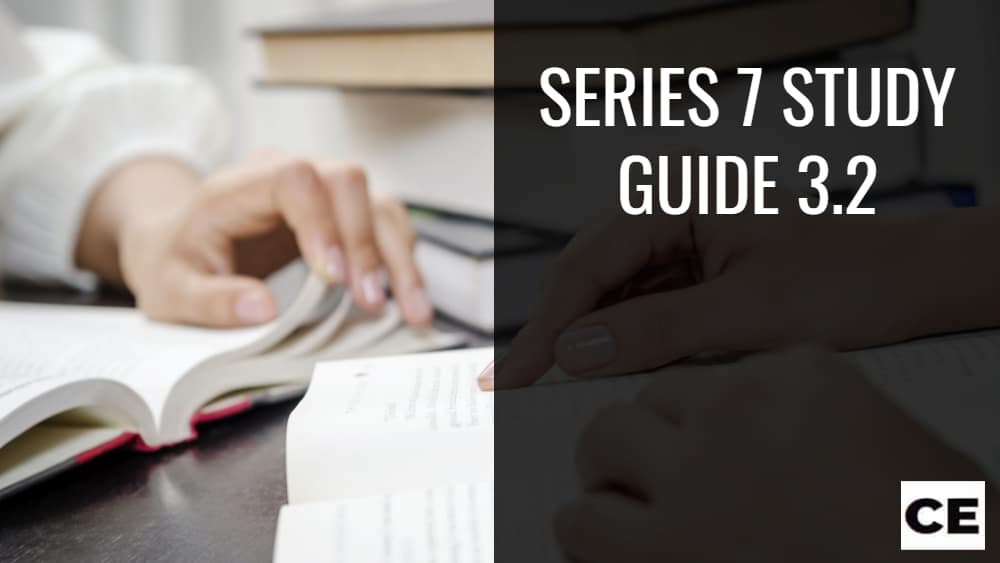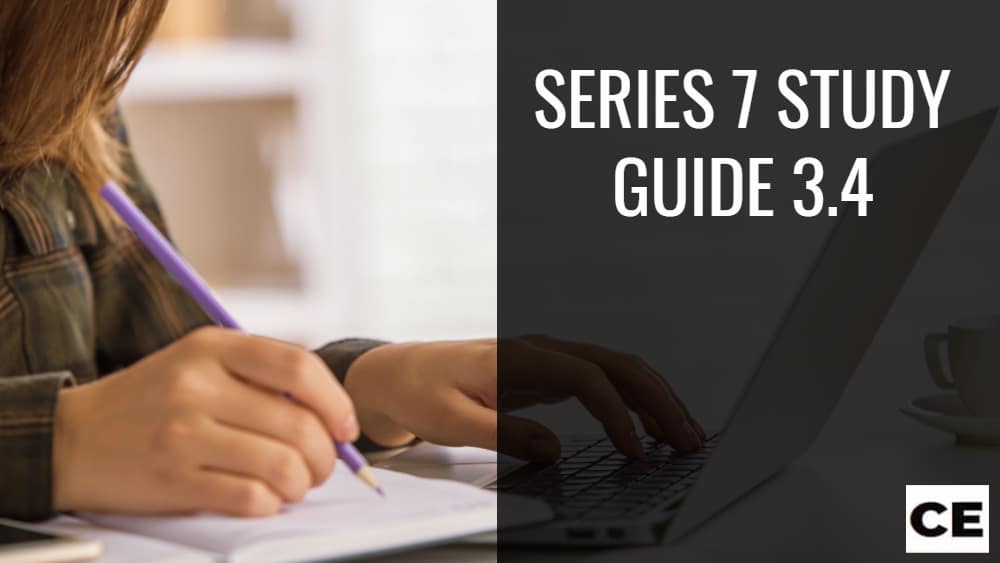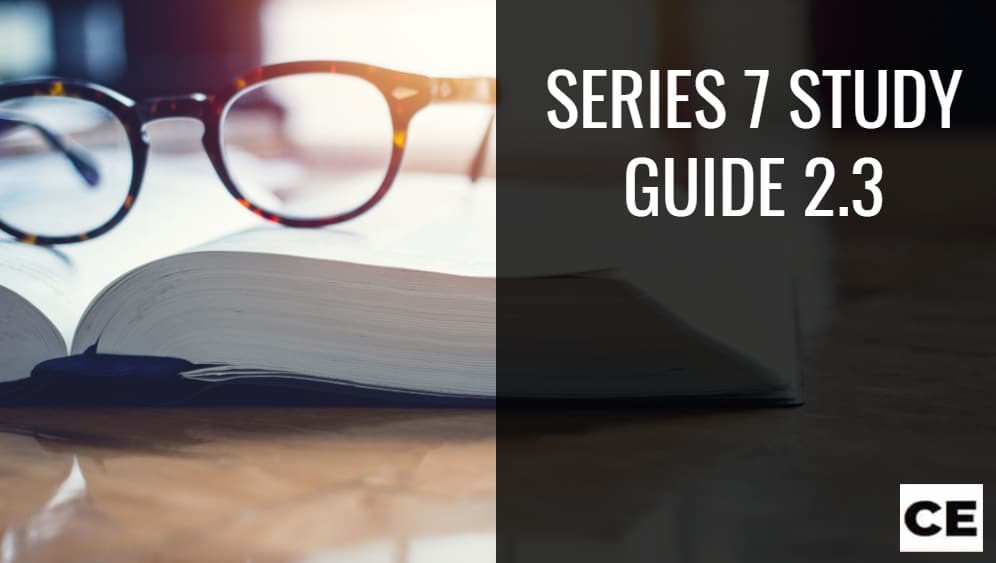Welcome!
We promise that after reading this, you’ll understand the Series 7 Exam content and the passing rate.
We’ll respond to the frequently asked questions concerning the Series 7 exam.
We will focus on the following:
- Series 7 exam structure
- Passing rate (which is naturally linked with Series 7 failure rates)
- Series 7 exam frequently asked questions
So yes, you are in the right place if you need to know more about this FINRA exam, so let’s jump straight in then.
Other free series 7 study materials:
- Series 7 exam prep
- Series 7 study plan
- Series 7 study guide
- Series 7 practice exams
- Series 7 flashcards
- Series 7 cheat sheet
- Series 7 Exam FAQ
- Best Series 7 study materials
Introduction
No doubt if you are reading this, you are trying to find out more about FINRA’s licensing exam known as Series 7.
And perhaps, in particular, the Series 7 exam difficulty and overall pass rate.
And that’s what we will cover here today.
This article looks at an exam taken by candidates that receive sponsorship from a FINRA member firm as a follow-on from the Securities Industry Essential (SIE) exam.
Series 7 Exam Structure
One of the best study tips we can give you is to understand aspects of the overall exam structure of Series 7.
Of the 135 questions you will have to answer, around 50 of them are options trading related.
And around 35 of those options trading-related questions deal specifically with option strategies.
According to Investopedia, they will cover the following areas:
- Covered contracts
- Spreads
- Hedges
- Puts
- Straddles
- Calls
Questions will also focus on the following critical aspects of each of those mentioned above:
- Maximum gains and loss
- Breakeven
- Stock movement related to profits
Candidates should also understand how questions are presented.
Like other FINRA exams, Series 6 for example, a bell curve technique is applied.
So the test starts with easier questions but they will gradually get more challenging.
This happens as you start to reach the midpoint of the exam.
Following that, the questions will again get easier as candidates move towards the end of the exam, hence the reference to a bell curve.
Yes, all questions are critical, but remember, you need 72% to pass.
That means getting 95 questions right.
And that should include the easier ones in the question bank, that’s for sure.
Series 7 Pass Fail Rate
How hard is the Series 7 exam?
Well, there is no doubt that it pushes candidates.
First up, you’ve got to prepare for almost four hours of exam time to complete the 135 questions.
From those figures alone, you can easily see that a poorly prepared candidate is going to struggle to achieve a passing mark.
But what score do you need to pass the exam?
Candidates must score 72% or more on the exam to pass.
And the passing rate for the Series 7?
Well, the average Series 7 score is 65% although Kaplan Financial claims it to be around 72% although that might be with using their Series 7 exam prep.
Again, however, it’s important to stress that proper exam preparation is key for most candidates to get through this exam first try.
Series 7 Exam Frequently Asked Question
What is the Series 7 license?
Series 7, also known as the general securities representative qualification exam, is an entry-level exam offered by the Financial Industry Regulatory Authority. The exam tests candidates’ competency in the roles and responsibilities of registered representatives. With the Series 7 license, industry professionals can sell and buy a wide range of products.
What is on the Series 7 exam?
The Series 7 exam content covers:
- Direct participation programs
- Corporate securities
- Variable annuities
- Investment company securities
- Government securities
- Municipal Securities
- Retirement plans
- Debt securities
- Mutual funds
- Taxation
- Rules and regulations
- Client and margin accounts
- Rules and regulations
Check the exam content outline on FINRA’s website.
What is required to take the Series 7 exam?
You must be sponsored by a self-regulatory organization or FINRA member firm. The firm completes and files Form U4 and pays the Series 7 exam cost of $245. The securities industry essentials (SIE) exam is a co-requisite for getting the Series 7 license.
What are Series 7 exam sample questions?
The Series 7 exam has 135 multiple-choice questions. One hundred twenty-five go towards your final score. Series 7 sample questions include practice questions and exams. Practice exams mimic the real exam to give you an overview of what to expect. You can then better prepare for the actual exam.
What is tested on the Series 7 exam?
The Series 7 exam tests candidates on securities products, suitability, and rules and regulations. The questions focus on testing exam-takers’ ability to provide investment recommendations that suit clients’ needs. That means test-takers must be able to evaluate customers’ financial profiles and investment objectives and give the best investment options.
What is the best book for passing the Series 7 exam?
Here is a list of the best Series 7 preparation books.
- Wiley Series 7 Securities Licensing Exam Review
- Pass the 7: A Plain English Explanation to Help You Pass the Series 7 Exam
- Series 7 Exam for Dummies, 4th Edition
What is the best Series 7 exam preparation
The best Series 7 exam prep includes:
- Securities Training Corporation
- Achievable
- Kaplan Financial Education
- ExamFX
- Knopmanmarks
- Securities Institute of America
These exam prep study materials have been tried and tested and found to be the best for Series 7 exam preparation.
What is the best tutor for the Series 7 exam?
Wyzant gives the following list of the best Series 7 exam tutors:
- Mark P.
- Mark C.
- Garth S.
- Karen H.
- Dana M.
- Rueben M.
- Barley V.
- Rob P.
- Sabastian E.
- William S.
These tutors can help you tie loose ends toward the Series 7 exam date.
What is the cost of taking the Series 7 exam?
The Series 7 exam fee is $245. Your sponsoring firm pays the amount. Just in case you fail in the first attempt, the exam retake is the same amount. There’s no limit to how many times you can take the exam.
Who takes the Series 7 exam?
Anyone interested in the financial securities industry can take the Series 7 exam. There is no education limitation to taking the exam. Test-takers include recent college graduates, high school graduates, and individuals changing careers. The only requirement is that test-takers must be sponsored by a FINRA member firm.
What does Series 7 allow you to do?
Series 7 certification allows you to sell and buy:
- Exchange-traded funds
- Stocks and bonds
- Real estate investment trusts
- Mutual funds
- Money market funds
- Options
- Variable contracts
- Municipal Securities
- Direct participation products
- hedge funds
You can’t sell:
- Real estate
- Life insurance
- Futures
- Commodities
What is covered in the Series 7 exam?
- Seeks Business for the Broker-Dealer from Customers and Potential Customers
- Opens Accounts after Obtaining and Evaluating Customers’ Financial Profile and Investment Objectives
- Provides Customers with Information about Investments, Makes Suitable Recommendations, Transfers Assets, and Maintains Appropriate Records
- Obtains and Verifies Customers’ Purchase and Sales Instructions and Agreements; Processes, Completes and Confirms Transactions
What are the benefits of passing the Series 7 exam?
Passing the Series 7 exam and its co-requisite SIE exam allows you to have a Series 7 license. With the license, you can sell many types of securities products except futures, commodities, real estate, and life insurance. It also opens your career as you can pursue other financial series exams.
How long does the Series 7 exam take?
The Series 7 exam takes three hours and forty-five minutes. The exam has 135 multiple-choice questions.
That means you have around one minute and thirty seconds to answer each question. If you fail the exam on the first attempt, wait 30 days for a retake.
Where to get study materials for the Series 7 exam?
There are dozens of Series 7 study materials online. You can leverage the free online materials or buy bundled courses from Series 7 prep course providers. Knopmanmarks, Securities Training Corporation, ExamFX, Kaplan Financial Education, Achievable, and Securities Institute of America are some of the best test prep providers.
How many questions are in the Series 7 exam?
The Series 7 exam has 135 questions, of which ten are not scored. These questions are evenly distributed in the exam. The Series 7 exam questions are weighted differently. So, to pass the first time, take time to prepare thoroughly for the exam.
What comes after the Series 7 exam?
The Series 7 securities license opens doors to many career paths. In your early career, you can take client service roles or mutual fund sales. You can also become a 401k service representative or a paraplanner. With experience, you can become a financial advisor, institutional broker, or trust officer.
Can I take the Series 7 exam before the SIE exam?
Yes. You can! Securities industries essentials is a co-requisite for the Series 7 exam. It can be taken before or after passing the Series 7 exam. But, it should be within four years. That said, most financial professionals recommend taking the SIE exam first.
What is the difference between the Series 6 and Series 7 license?
Series 6 license, also known as the investment company and variable contracts products representative qualification exam, allows candidates to sell variable annuities and mutual funds. Series 7 exam, general securities representative exam, allow test-takers to sell all the products in Series 6, plus ETF, stocks, bonds, and options.
How do I earn a Series 7 license?
- Take the SIE exam and pass
- Secure sponsorship from an SRO or FINRA member firm
- Study for the Series 7 exam. You can leverage exam prep courses sold online.
- Take the Series 7 test and pass
- Earn your Series 7 license
Do I need to take the Series 7 top-off exam if I already have a different securities license?
It depends. If you want to become a stockbroker and sell a wide range of securities products, then the Series 7 exam is a must-take. On the other hand, if you are not interested in selling securities products, there’s no need to take the exam.
How much time does it take to study for the Series 7 top-off?
Candidates must put in anything from 80 to 150 hours of study and prep for the Series 7 exam. Also, experts recommend attempting at least 1000 practice questions. Score around 80% on your practice tests, and you should be able to pass the actual exam.
What jobs can I get with a Series 7 license?
Here is a list of jobs you can get with a Series 7 exam license.
- Investment manager
- Mutual fund manager
- Insurance agent
- Finance Advisor
- Financial Planner
- Trust officer
- Investment broker
As you advance in your career, you get better job opportunities.
What are the pass rates and passing scores for the exam?
The Series 7 exam pass rate is 65% for first-time test-takers. The passing score is 72%.
The exam has 125 scored questions. That means you have to get 90 questions right to reach the passing score. Make the most of the test time on the Series 7 test date.
If I fail the Series 7 exam, what is the wait time before I can retake it?
If you fail the Series 7 exam three times consecutively, you’ll have to wait 30 days each time to retake the exam. If you fail again after the three attempts, you must wait 180 days. That’s around six months before you retake the exam.
Can anyone take the Series 7 exam?
Anyone can take the Series 7 exam. The only requirement is sponsorship by a FINRA member firm or a security regulatory organization. To earn the Series 7 license, you must also take the SIE exam within four years of taking the Series 7 exam.
Is Series 7 the hardest FINRA exam?
Yes. Many experts say Series 7 is the hardest of the FINRA securities licensing exams. The Series 7 exam is challenging because it has extensive content coverage. The exam questions are detailed and cover the four functions of a stockbroker.
Is Series 7 hard to pass?
Yes, this is one tough exam. In fact, many experts believe that when you compare it to other FINRA securities licensing exams, the Series 7 is, without a doubt, the most difficult of them all. If you don’t prepare, prepare to fail. It really is that simple.
What is FINRA Series 7 pass rate?
There are conflicting reports on the pass rate for Series 7. For example, most experts have it at around 65%, which makes sense considering how hard the exam is. Kaplan says it’s 72%, but that might be for candidates using their study material.
What is the Series 7 fail rate?
If around 65% of people pass the exam, then 35% fail it. Ultimately, it’s not that simple because the pass rate doesn’t factor in people passing on their second or third attempt. However, a third of the people taking it and failing shows just how tough it is.
How many times can you fail Series 7?
There is no restriction at all. You don’t want to fail for two reasons. First up, it costs you another $245 to write it again. Also, you have to wait 30 days between attempts initially. If you fail a third time, the waiting period becomes 180 days.
Conclusion
And that’s it for this article that gives you a little more insight into what the Series 7 exam is all about.
We’ve answered as many frequently asked questions about Series 7 exam as possible.
We hope all your concerns are now cleared.
But if not, don’t hesitate to leave your question in the comment section.
We’ll definitely get back to you.
Good luck!
Resources
1. Kaplan
2. Knopman
3. Investopedia
4. Securities Institute of America
5. Finra









